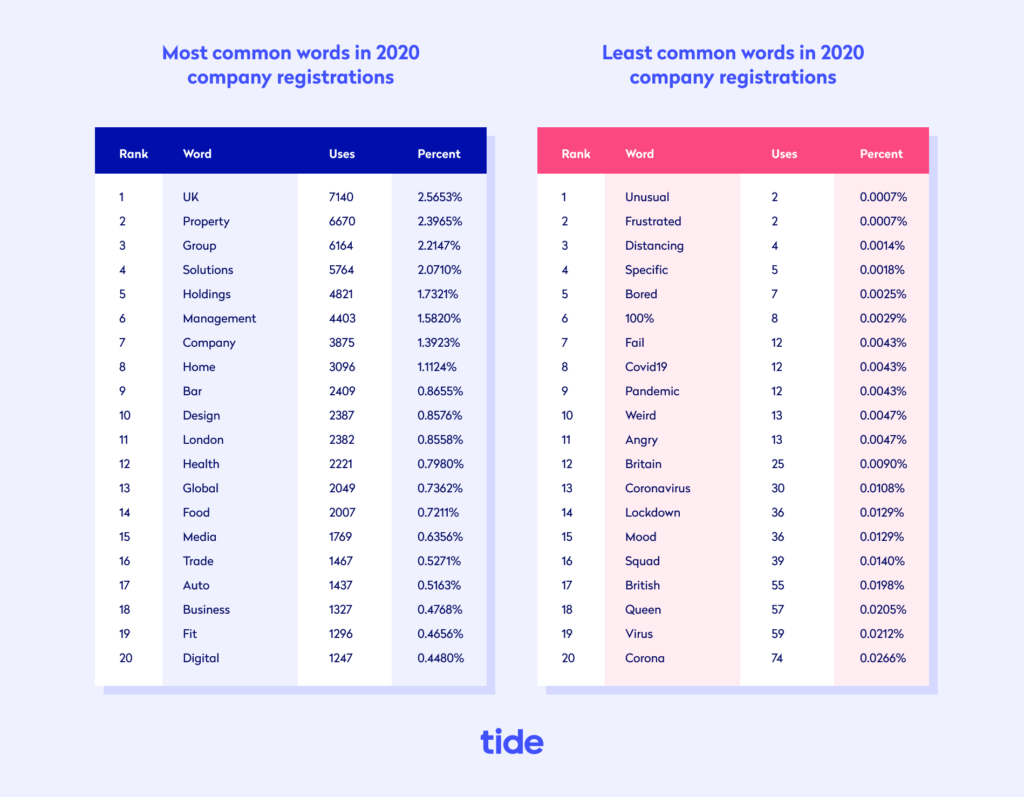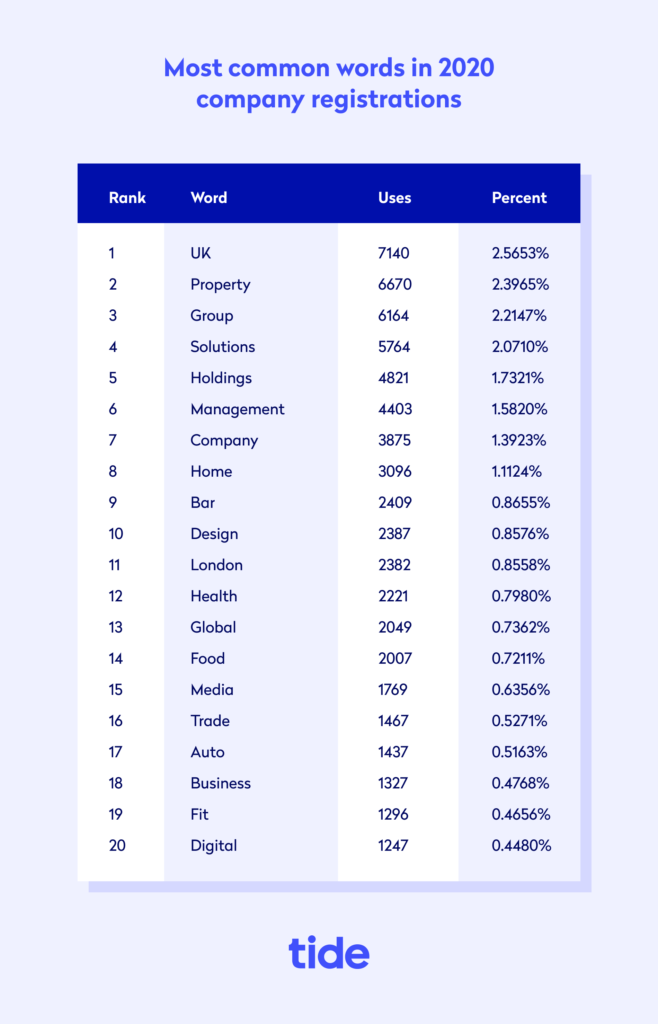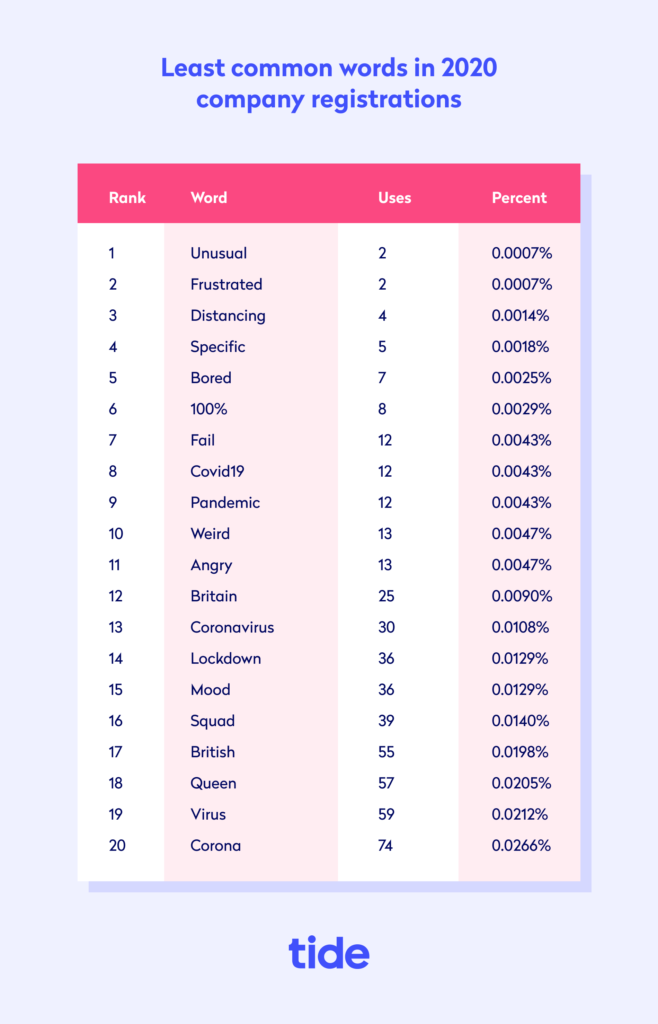
Company naming trends: what should you call your company in 2020?

Choosing the name for your company is one of the trickiest decisions you have to make as a business founder.
You’ll want to sum up the nature of your business, while also leaving room for growth, and also creating a distinction between you and your competitors.
And we haven’t even mentioned the potential trademark issues or the need to find a web domain that matches your brand name.
How do other business founders approach this challenge?
We’ve gone digging through the data from Companies House to discover trends and patterns in the naming of new companies.
Here are our findings, based on the 278,325 companies formed from 1 January to 31 May 2020.



Location, location, location
The most popular word found in new companies registered in 2020 is ‘UK’, with 7140 companies including it in their name.
‘London’ was another popular choice, with 2382 companies using the capital as part of their identity.
One in every 40 companies included ‘UK’ in their name, but only 25, or 0.0009%, of new companies chose ‘Britain’.
Names that indicate size or scale are unsurprisingly common, although ‘global’ was significantly more popular than ‘world’.
‘Global’ appeared in 2049 new company names, compared to just 855 instances of ‘world’. This may be because ‘global’ suggests a company that can serve the world, whereas ‘world’ may just indicate a large product range or a big experience (e.g. Disney World, Monkey World, Toy World etc).
Category names are commonly used
Despite the trend for abstract company names (e.g. Amazon, Zappos, Apple), many of the companies forming in 2020 are making it clear what they offer, or at least their industry or commercial category.
For example, ‘design’, ‘health’, ‘food’, ‘media’, ‘auto’, ‘fit’, and ‘digital’ are all strongly represented in new company formations.
By including these terms in their company names, the founders are making it easier to communicate their offerings and improving their chances of being understood, without having to spend millions of pounds on raising awareness.
Big names carry weight
In your line of business, is it better to appear big, or small?
In certain business areas, such as craft manufacturing, brewing, food production or jewellery, appearing small can be desirable. It might help to convey the idea that your products are unique, homemade, or hand-crafted.
In other business areas, the opposite is true.
Imagine you want to engage a company to help promote your brand around the world, or to represent your legal interests in multiple jurisdictions. Clearly, having a partner that spans the globe is essential.
And in-between these poles, there’s a huge middle-ground, in which medium-sized companies rule the roost.
Why? Because massive companies can feel aloof and unattainable, yet tiny home-baked operations may not have the scale to meet demand. This middle-ground could be described as a corporate Goldilocks Zone, in which companies are neither too large nor too small, but are just right.
Unsurprisingly, many new companies have included ‘group’, ‘holdings’, ‘management’ and ‘company’, all words that allude to an advanced degree of capability, organisation, stature and reach.
Positive names are popular
As a business, you want to project an image of success and competence. People are more likely to trust a business that appears to be successful, and more likely to fear, or avoid, an enterprise that seems to be struggling.
‘Top’, ‘good’, ‘elite’, ‘best’, and ‘great’ are all popular additions to company names, garnering a combined 2659 appearances so far in 2020.
Compare this to ‘bad’ and ‘fail’ which appear just 187 times.
Negative names are rarely selected
Having seen that many company founders choose names that project strength, power and reach, it’s unsurprising that very few companies include negative words.
After all, most companies exist to offer solutions to problems. Branding usually focuses on reminding people of the solution, not the problem.
But this didn’t stop 59 companies from including ‘virus’ in their company name. Nor did it prevent a combined 24 companies from including ‘Covid19’ or ‘pandemic’ in what appear, on the surface, to be particularly limited companies. Pun intended. Based on the data, these businesses seem well-natured rather than founded out of protest or anger – most tended to be either product-focused e.g. masks, legal-based, research and experimental development e.g. on biotechnology, or software publishing and web portals e.g. for tracing. However, what will these companies do if/when COVID-19 subsides, or is treated by a vaccine?
Interestingly, a handful of new companies included the words ‘bored’, ‘fail’, ‘weird’ and ‘angry’. The businesses which used ‘bored’ typically related to retail goods, such as clothing or pet products, or media businesses such as video production, showing that while negative in sentiment on the face of it, the word ‘bored’ is being used as a branding tool.
When it came to the word ‘weird’, again this seemed to be used as a branding exercise – phrases such as ‘stay weird’ or ‘weird and wonderful’ popped up. The word ‘fail’ was used in a business name for a company completing wireless telecommunications activities, and another completing motion picture production, but on both occasions the negative word seemed to be used in jest. Interestingly, the word ‘angry’ appeared at two ends of a spectrum, for various retail businesses, as well as several freight companies.
What makes a good company name?
We’ve looked at some of the most common words to appear in company names so far in 2020. But what makes a good company name?
That’s not an easy question to answer, because it all depends on you and your business, products, services, future expansion plans, competitors, customer base, location, market, brand, differentiators and positioning, to name a few.
Good names are:
Memorable, because your business can’t afford to be forgotten.
Pronounceable, because it’s hard to recommend a business you can’t say aloud.
Distinctive. A common mistake in business naming and branding is to look at competitors in the field and then choose an identity that helps you fit in. But branding is not camouflage. It should help you stand out, not fit in.
Category-appropriate. You want to stand out by being original, not by being odd or inappropriate. For example, you probably won’t find a tattoo parlour branded like a spa. And you wouldn’t find a firm of international tax advisors branded like a farm shop. Each industry and category has its own conventions. Sometimes it pays to subvert expectations, but be sure you understand the risks and benefits first.
Meaningful. Your company name doesn’t have to have a literal connection to your offerings, but it should carry some meaning, even if this is limited to an evocation of a feeling or mood.
Flexible. You might be 100% certain that your newly-formed company is only ever going to sell tomatoes, and that Totally Tomatoes is the perfect name. And you may be right. But you might want to consider a name that gives you room to flex. Does your company name give you the freedom to change commercial direction? Or add new products or services? If your initial market evaporated, or became redundant, could you pivot to a new region or service offering?
Available as web domains and social media profiles. If the domain or social media handle for your preferred name is taken, could you try a workaround, like ‘thisisBusinessName.com’ or ’weareBusinessName.com’? You could also look through the Companies House register to get an idea of what is already taken. As a word of caution, if you decide to look at similar words outside of your actual business name, be conscious of any related meanings or associations.
Top Tip: Check your company name for FREE! Bulk search up to 8 names at once and check company name availability with our free business name checker tool 🔍
Your company name doesn’t have to define you
Although choosing your business name is important, it’s worth remembering that not all companies stand by their legal name.
You can also trade under different names, providing you always display your legal company name on official documents.
So while you should choose your company name carefully, remember that there are ways to break free, should you happen to change direction.
To better understand the impact of COVID-19 on the business world, we also recently analysed Companies House data to find how many businesses have been registered or ceased trading since the beginning of 2020, breaking down the data by month, industry, and location – you can take a look at the research here
—
All data and sources can be found here.
Photo by Jon Tyson, published on Unsplash






